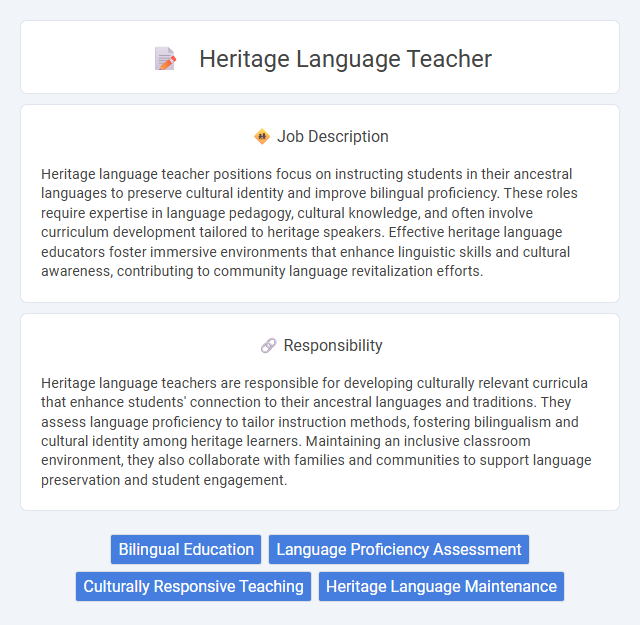
Heritage language teacher positions focus on instructing students in their ancestral languages to preserve cultural identity and improve bilingual proficiency. These roles require expertise in language pedagogy, cultural knowledge, and often involve curriculum development tailored to heritage speakers. Effective heritage language educators foster immersive environments that enhance linguistic skills and cultural awareness, contributing to community language revitalization efforts.
Individuals with strong proficiency in their heritage language and a passion for cultural preservation are likely well-suited for a heritage language teacher role. Those who enjoy engaging with diverse communities and fostering language skills in younger generations may find this position rewarding. However, candidates with limited language fluency or minimal interest in educational methodologies might face challenges in meeting job demands effectively.
Qualification
Heritage language teachers typically require a bachelor's degree in linguistics, education, or a related field, along with specialized training in bilingual education or heritage language instruction. Proficiency in the target heritage language, supported by native or near-native fluency and cultural competence, is essential for effective teaching. Certification or licensure in language teaching and experience working with heritage language learners enhance job qualifications significantly.
Responsibility
Heritage language teachers are responsible for developing culturally relevant curricula that enhance students' connection to their ancestral languages and traditions. They assess language proficiency to tailor instruction methods, fostering bilingualism and cultural identity among heritage learners. Maintaining an inclusive classroom environment, they also collaborate with families and communities to support language preservation and student engagement.
Benefit
Heritage language teacher jobs likely provide significant benefits such as fostering cultural preservation and enhancing bilingual skills among students. These roles may offer professional growth opportunities through engagement with diverse communities and tailored curriculum development. Teachers in this field probably experience a rewarding sense of contribution to students' identity and community connection.
Challenge
Teaching heritage languages likely involves the challenge of addressing diverse proficiency levels within a single classroom, requiring tailored instructional strategies. It probably demands balancing cultural preservation with language acquisition, which can complicate curriculum development. There is a strong chance that teachers must navigate varying student motivation and external support, impacting overall language retention outcomes.
Career Advancement
Heritage language teachers possess specialized skills in bilingual education and cultural preservation, which position them for career advancement opportunities in diverse educational settings. Mastery in curriculum development for heritage speakers and proficiency in assessment of language proficiency are key competencies that enhance employability and promotion potential. Ongoing professional development in linguistics and intercultural communication supports progression into leadership roles such as program coordinator or academic advisor within language education institutions.
Key Terms
Bilingual Education
Heritage language teachers play a crucial role in bilingual education by preserving students' native languages while promoting academic proficiency in English. These educators design culturally responsive curricula that support language maintenance and enhance cognitive development across both languages. Effective heritage language instruction fosters bilingualism, biliteracy, and cultural identity, contributing to students' overall academic success and social integration.
Language Proficiency Assessment
Heritage language teachers specialize in conducting Language Proficiency Assessments to evaluate students' speaking, reading, and writing skills in their native languages. These assessments help tailor instruction to individual learner needs and measure progress in heritage language acquisition. Accurate evaluation through standardized proficiency tests ensures effective curriculum development and supports cultural preservation initiatives.
Culturally Responsive Teaching
Heritage language teachers play a crucial role in preserving linguistic and cultural identities by implementing culturally responsive teaching strategies tailored to diverse student backgrounds. These educators incorporate students' cultural experiences and heritage into the curriculum, fostering a supportive environment that enhances language acquisition and cultural pride. Emphasizing culturally relevant pedagogy improves engagement, academic achievement, and intergenerational connection within heritage language communities.
Heritage Language Maintenance
Heritage language teachers play a crucial role in heritage language maintenance by providing instruction that fosters linguistic competence and cultural identity among heritage speakers. They implement specialized curricula tailored to the unique needs of students who speak the language at home but lack formal education in it, ensuring language retention across generations. Effective heritage language teaching supports the preservation of minority languages and promotes bilingualism within communities.
 kuljobs.com
kuljobs.com